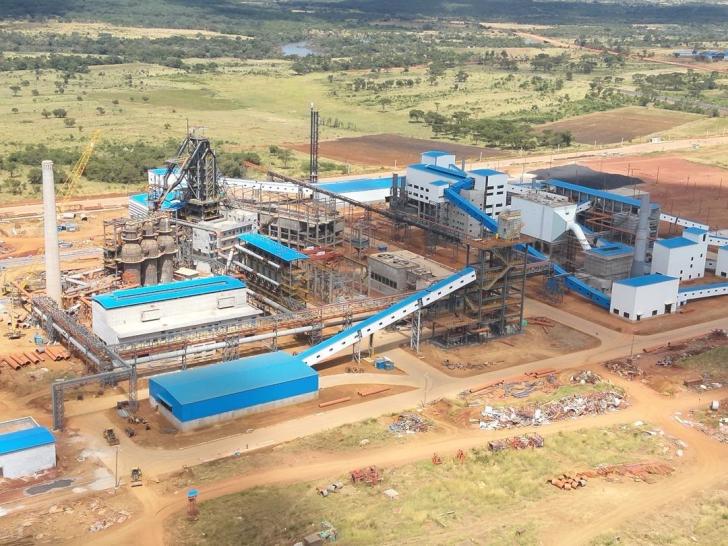News / National
Zimbabwe's Manhize steel plant hits key milestone
05 Feb 2025 at 11:48hrs |
0 Views

The US$1.5 billion Manhize Steel Plant, located in the Midlands province, has officially commenced the production of reinforced steel bars (rebars), marking a significant milestone in Zimbabwe's industrial development and its efforts to align with Vision 2030.
This new phase of production is set to play a crucial role in supporting the country's infrastructure development, reducing imports, and boosting the construction industry, all of which contribute to Zimbabwe's long-term economic growth.
The Manhize Steel Plant, part of the Tsingshan Group of China's extensive investment in Zimbabwe, is one of the country's largest mining projects. Tsingshan Group is already deeply involved in other major projects such as Afrochine Smelting in Selous, Mashonaland West, which specializes in chrome smelting, and Dinson Colliery in Hwange, Matabeleland North, which focuses on coke production. All of these interconnected projects support steel production by supplying essential materials such as ferrochrome and coke.
The plant's move to produce rebars is seen as a crucial step towards diversifying its product range, with plans to eventually produce other items including pipes, bolts and nuts, smaller slags, rolled tubes, fences, shafts, and wires. The current target for steel production in the first phase of the plant's operations is 600,000 tonnes of steel products annually.
In an interview, Mr. Wilfred Motsi, Project Director for Disco, confirmed the start of rebar production, stating, "That is true, we have started production, and most of the products will be for the local market. The surplus will be exported to improve export revenue generation and balance of payments."
This development has been warmly welcomed by industry leaders, particularly in the construction sector. Dr. Tinashe Manzungu, President of the Zimbabwe Building Contractors Association, called the production of rebars at Manhize a welcome addition. "We are working to close the infrastructure gap as contractors, and this requires huge capital outlay. Manufacturing such products locally will cut costs significantly, making the final products more affordable," he said.
Dr. Manzungu further emphasized that this development will also help drive the capacity utilization of industries, addressing the chronic shortage of foreign currency for importing raw materials. "There has been an acute shortage of foreign currency to import raw materials, such as what Disco Manhize is now producing," he explained.
Mr. Dosman Mangisi, Chief Operations Officer of the Zimbabwe Institute of Foundries, also praised the move, saying, "The manufacture of rebars will give a major boost to the construction industry, which has been facing challenges due to reliance on imported materials."
As Zimbabwe moves closer to achieving its Vision 2030 goals, the success of the Manhize Steel Plant in producing steel products locally represents a crucial step towards economic self-sufficiency, job creation, and industrialization.
This new phase of production is set to play a crucial role in supporting the country's infrastructure development, reducing imports, and boosting the construction industry, all of which contribute to Zimbabwe's long-term economic growth.
The Manhize Steel Plant, part of the Tsingshan Group of China's extensive investment in Zimbabwe, is one of the country's largest mining projects. Tsingshan Group is already deeply involved in other major projects such as Afrochine Smelting in Selous, Mashonaland West, which specializes in chrome smelting, and Dinson Colliery in Hwange, Matabeleland North, which focuses on coke production. All of these interconnected projects support steel production by supplying essential materials such as ferrochrome and coke.
The plant's move to produce rebars is seen as a crucial step towards diversifying its product range, with plans to eventually produce other items including pipes, bolts and nuts, smaller slags, rolled tubes, fences, shafts, and wires. The current target for steel production in the first phase of the plant's operations is 600,000 tonnes of steel products annually.
This development has been warmly welcomed by industry leaders, particularly in the construction sector. Dr. Tinashe Manzungu, President of the Zimbabwe Building Contractors Association, called the production of rebars at Manhize a welcome addition. "We are working to close the infrastructure gap as contractors, and this requires huge capital outlay. Manufacturing such products locally will cut costs significantly, making the final products more affordable," he said.
Dr. Manzungu further emphasized that this development will also help drive the capacity utilization of industries, addressing the chronic shortage of foreign currency for importing raw materials. "There has been an acute shortage of foreign currency to import raw materials, such as what Disco Manhize is now producing," he explained.
Mr. Dosman Mangisi, Chief Operations Officer of the Zimbabwe Institute of Foundries, also praised the move, saying, "The manufacture of rebars will give a major boost to the construction industry, which has been facing challenges due to reliance on imported materials."
As Zimbabwe moves closer to achieving its Vision 2030 goals, the success of the Manhize Steel Plant in producing steel products locally represents a crucial step towards economic self-sufficiency, job creation, and industrialization.
Source - the chroncile
Join the discussion
Loading comments…





























